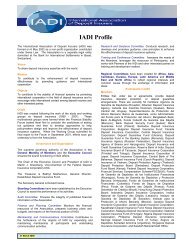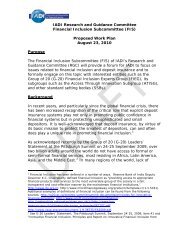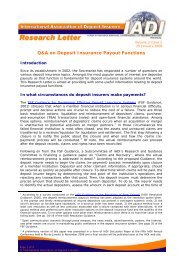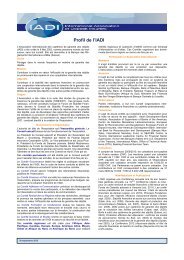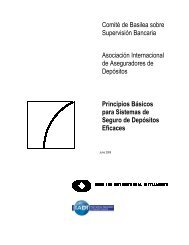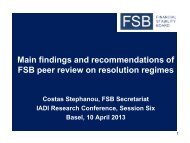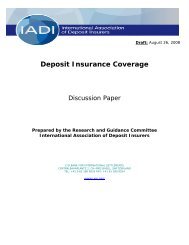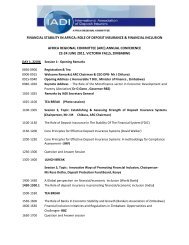Volume II - PDF - International Association of Deposit Insurers
Volume II - PDF - International Association of Deposit Insurers
Volume II - PDF - International Association of Deposit Insurers
- No tags were found...
Create successful ePaper yourself
Turn your PDF publications into a flip-book with our unique Google optimized e-Paper software.
•BACKGROUND DOCUMENTS•<br />
Part I: Research<br />
funding arrangements. Limits to coverage should<br />
be applied per depositor, per financial institution.<br />
This reduces the possibility that depositors will be<br />
able to circumvent the coverage limits without<br />
imposing excessive administrative costs on the<br />
deposit insurer.<br />
The scope and level <strong>of</strong> coverage should be revised<br />
periodically. Adjustments should be made as necessary<br />
in light <strong>of</strong> changes in the financial sector.<br />
A deposit insurance system must take a pro-active<br />
approach to determining what is and what is not<br />
insured and must communicate this effectively to<br />
insured institutions and the general public.<br />
Endnotes<br />
1 The Subgroup on Coverage is comprised <strong>of</strong> representatives<br />
from Chile (coordinator), Germany,<br />
Hungary, Italy, the United States and the <strong>International</strong><br />
Monetary Fund. Members <strong>of</strong> the Subgroup on<br />
Coverage contributed information on their deposit<br />
insurance systems for this paper. Comments received<br />
from the Working Group’s consultative process also<br />
were considered in the preparation <strong>of</strong> this paper.<br />
2 See the papers on public-policy objectives, moral<br />
hazard, situational analysis, transitioning, membership,<br />
funding, depositor priority, depositor reimbursement<br />
and cross-border issues for in-depth<br />
discussions <strong>of</strong> these issues.<br />
3 The practices to curtail moral hazard are discussed<br />
at length in the paper on moral hazard.<br />
4 The opening <strong>of</strong> multiple accounts in order to increase<br />
deposit insurance coverage is referred to as “deposit<br />
stacking.”<br />
5 There may be other variations on how the coverage<br />
limit is applied. For example, the coverage limit may<br />
be applied per depositor, but a depositor may be<br />
able to increase his or her coverage limit by holding<br />
deposits under different rights and capacities. See<br />
the paper on reimbursing depositors.<br />
6 See the paper on moral hazard for a description <strong>of</strong><br />
the mechanisms that countries may use to limit the<br />
exposure <strong>of</strong> their deposit insurance system.<br />
7 Some countries have used indexing units as a means<br />
to protect contracting parties from the effects <strong>of</strong><br />
inflation.<br />
8 To illustrate, suppose that a depositor has a foreigncurrency-denominated<br />
deposit <strong>of</strong> $10 and the local<br />
currency is the Peso. On the day <strong>of</strong> failure the<br />
exchange rate is 1 Peso = $1. By the day <strong>of</strong> repayment,<br />
however, the exchange rate is 2 Pesos = $1. If the<br />
deposit is valued at the prevailing exchange rate on<br />
the day <strong>of</strong> failure, then the depositor will receive 10<br />
Pesos on the date <strong>of</strong> repayment, which can then be<br />
converted to $5. If, however, the deposit is paid at<br />
the exchange rate prevailing on the date <strong>of</strong> repayment,<br />
then the depositor will receive 20 Pesos,<br />
which can be converted to $10. Under the first scenario,<br />
the depositor bears the risk <strong>of</strong> devaluation;<br />
under the second scenario, the deposit insurer bears<br />
that risk.<br />
51<br />
Guidance for Developing Effective <strong>Deposit</strong> Insurance Systems: <strong>Volume</strong> <strong>II</strong>



